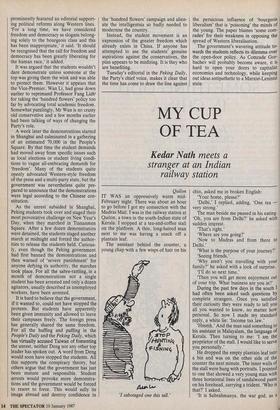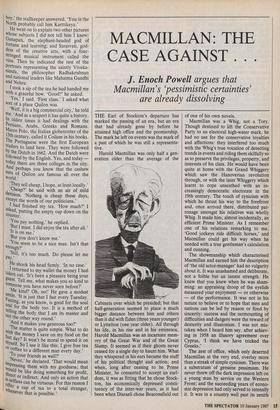MY CUP OF TEA
Kedar Nath meets a
stranger at an Indian railway station
Quilon IT WAS an oppressively warm mid- February night. There was about an hour to go before I got my connection with the Madras Mail. I was in the railway station at Quilon, a town in the south-Indian state of Kerala. I stopped at a tea-and-coffee stall on the platform. A thin, long-haired man next to me was having a snack off a plantain leaf.
The assistant behind the counter, a young chap with a few wisps of hair on his 'I sabotaged one this tall.' chin, asked me in broken English: 'Your home, please?'
'Delhi,' I replied, adding, 'One tea — very strong.'
The man beside me paused in his eating. 'Oh, you are from Delhi?' he asked with sudden interest.
'That's right.'
'Where are you going?'
'Now to Madras and from there to Delhi.'
'What is the purpose of your journey?' 'Seeing friends.'
'Why aren't you travelling with your family?' he asked with a look of surprise. 'I'll do so next time.'
'Then you will get more enjoyment out of your trip. What business are you in?' During the past few days in the south I had often been asked such questions by complete strangers. Once you satisfied their curiosity they were ready to tell you all you wanted to know, no matter how personal. So now I made my standard reply, a white lie: 'Income tax law.'
`Hmmh.' And the man said something to his assistant in Malayalam, the language of Kerala. Then turning to me: 'I am the proprietor of the stall. I would like to serve you personally.'
He dropped the empty plantain leaf into a bin and was on the other side of the counter the next minute. The inner walls of the stall were hung with portraits. I pointed to one that showed a very young man with three horizontal lines of sandalwood paste on his forehead, carrying a trident. 'Who is that?' I asked.
'It is Subrahmanya, the war god, as a
boy,' the stallkeeper answered. 'You in the North probably call him Karttikeya.' He went on to explain two other pictures Whose subjects I did not tell him I knew: Ganapati, the elephant-headed god of fortune and learning; and Sarasvati, god- dess of the creative arts, with a four- stringed musical instrument called the vina. Then he indicated the rest of the Portraits representing the saintly Viveka- nanda, the philosopher Radhakrishnan and national leaders like Mahatma Gandhi and Nehru.
.1 took a sip of the tea he had handed me With a graceful bow. 'Good?' he asked.
'Yes,' I said. 'First class.' I asked what sort of a place Quilon was. 'Well, it is a big commercial city,' he told me. 'And as a seaport it has quite a history. In olden times it had dealings with the Persians, Arabs, Greeks and Romans. Marco Polo, the Italian globetrotter of the 13th century, called it Coilum in his books. The Portuguese were the first European traders to land here. They were followed by the Dutch in 1662. And the Dutch were followed by the English. Yes, and today — today there are three colleges in the city. And perhaps you know that the cashew nuts of Quilon are famous all over the They sell cheap, I hope, at least locally.' 'Cheap?' he said with an air of mild derision. 'Nothing is cheap these days, except the words of our politicians.' I had finished my tea. 'How much?' I asked, putting the empty cup down on the counter.
You pay nothing,' he replied.
But I must. I did enjoy the tea after all.' It is on me.' ,But you don't know me.'
You seem to be a nice man. Isn't that enough?'
'Still, it's too much. Do please let me Pay.'
He shook his head firmly. 'In no case.' 1 returned to my wallet the money I had taken out. 'It's been a pleasure being your guest. Tell me, what makes you so kind to someone you have never seen before?' Me kind? Oh, no!' He gave a modest snide. 'It is just that I fast every Tuesday. Pasting, as you know, is good for the soul and for the body too. It is a method of telling the body that I am its master and not the other way round.'
,And it makes you generous too?' . The matter is quite simple. What to do With the money I save on my food on the fast day? It won't be moral to spend it on myself. So I use it like this: I give free tea °I.,coffee to a different man every day.' ,To your friends as well?' Never,' he declared. 'That would mean IMPressing them with my goodness; that w..ould be like doing something for profit, irect or indirect. And only an action that is selfless can be virtuous. For this reason I offer a cup of tea to a total stranger, whenever that is possible.'











































 Previous page
Previous page